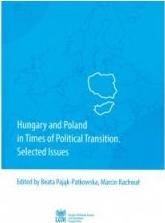34.90 zł

Hungary and Poland in Times of Political...
red. Beata Pająk-Patkowska, Marcin Rachwał
56.70 zł
Książkę najtaniej kupisz w księgarni MATFEL.PL
| MATFEL.PL | 34.90 zł | do sklepu |
| Możliwy odbiór osobisty. Punkt odbioru: Kraków. | ||
| TANIAKSIAZKA.PL | 44.31 zł | do sklepu |
| Możliwy odbiór osobisty. Osobiście można odebrać zamówienia powyżej 24,99 zł. Dla zamówień 24,99 - 98,99 koszt 4,90 zł. Zakupy powyżej 99 zł koszt 0 zł. Punkty odbioru: Białystok, Bielsko-Biała, Częstochowa, Ełk, Gdańsk, Gdynia, Grajewo, Katowice, Kielce, Kraków, Lublin, Łomża, Łódź, Piotrków Trybunalski, Poznań, Przemyśl, Rzeszów, Suwałki, Szczecin, Świdnica, Toruń, Warszawa, Wrocław, Zabrze, Zielona Góra, Zielonka |
||
| DADADA.PL | 44.94 zł | do sklepu |
| Możliwy odbiór osobisty. Łódź (koszt 5.99 zł) | ||
| SWIATKSIAZKI.PL | 46.70 zł | do sklepu |
| Możliwy odbiór osobisty. W księgarniach w całej Polsce | ||
Poland and Hungary after the Second World War remained in the sphere of influence of the Union of Soviet Socialist Republics and couldnt make independent decisions about domestic and foreign policies. Political transitions that began at the turn of 1980s has shifted the image of Central and Eastern Europe. Countries of the region regained the possibility to make independent decisions, which resulted in development of democracy, market economy and triggered transitions within the societies. Nowadays it is already 28 years since the political transition has begun. Hence, there are many questions about the course of this process in both countries. (...) The research was focused on two dimensions of a political system, i.e. the authors illustrated the condition of democracy as well as the condition of civil society in the countries concerned. The starting point was formed by comparative research into initiation of the political transition in Hungary and Poland, the adopted constitutional solutions as well as the manner in which the political system was functioning in the first years following the social and political adjustments. Further on, the researches on evolution of democracy in the both countries have been undertaken. What is important, from the perspective of contemporary times it is visible that Polish and Hungarian governments are formed by political parties which have introduced (and are still introducing) many significant changes within the political systems that faced e.g. unfavourable reactions from the part of several member states of the European Union. As a consequence, there appears a question about the causes that led to the current state of affairs. What is more, the possible paths for developing political systems of the both countries are frequently being analysed. The first research field concerned the democratic political system. The second issue addressed by the research team concerned the problems of creating and developing civil society in Poland and Hungary. Research questions undertaken within the mentioned scope included a significant issue of the role of societies in Hungary and Poland at initiating the political transition. Moreover, the research aimed at illustrating the condition of civil society in both countries within the period between 1989 and 2016. (...) The articles that form this book have been divided into two parts. The first part refers to Hungary, while the other part concerns Poland. Opis stanowi fragment Wstępu
